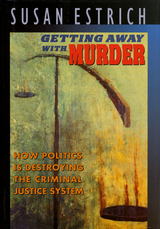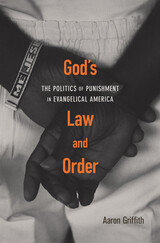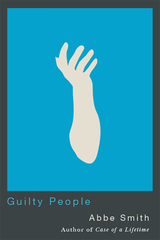3 start with G start with G

Justice isn't blind. It's winking. This is the message Americans get when, against the weight of overwhelming evidence, high-profile suspects go free; when there are special sentencing rules for battered wives or adult survivors of childhood abuse; when murderers are released from prison to rape and murder again, and politicians make political hay out of these cases; when lawyers look less like servants of higher values and more like profit seekers reaping fortunes by helping clients get away with murder. This book is a penetrating look into what's wrong with the American legal system, a devastating critique of how politics has corrupted criminal law in America.
Written with clarity and simplicity, Getting Away with Murder is a lesson in how the law works and a blueprint for how it should work. Susan Estrich takes on the enflamed issues, from the O. J. Simpson trial to three strikes legislation, but pushes well beyond the soundbite answers. Drawing on her background as a lawyer, political commentator, professor, and national campaign manager for Michael Dukakis, she brings academic expertise and political experience together in a way that very few people can.
In particular, Estrich argues that group-based jury nullification, like group-based abuse excuses, is precisely the wrong answer to the biases of the criminal justice system. Getting Away with Murder also views this system in the wider political arena, where fiascoes like the Willie Horton case stifle political debate and promote policies that tie the hands of judges in dealing with dangerous offenders. Lawyers do not escape Estrich's notice; she directs some of her most pointed remarks at the failure of the legal profession to tend to the ethical duties and legal values that it professes.
At a time when three quarters of black Americans believe that the criminal justice system is racist and unfair; when nearly half of all whites think it's ineffective and in decline; when crime, though falling, still tops the list of public concerns, and politicians exploit public distrust of the system to get elected, Getting Away with Murder makes a statement that is powerful, controversial, and urgently needed.

Winner of a Christianity Today Book Award
An incisive look at how evangelical Christians shaped—and were shaped by—the American criminal justice system.
America incarcerates on a massive scale. Despite recent reforms, the United States locks up large numbers of people—disproportionately poor and nonwhite—for long periods and offers little opportunity for restoration. Aaron Griffith reveals a key component in the origins of American mass incarceration: evangelical Christianity.
Evangelicals in the postwar era made crime concern a major religious issue and found new platforms for shaping public life through punitive politics. Religious leaders like Billy Graham and David Wilkerson mobilized fears of lawbreaking and concern for offenders to sharpen appeals for Christian conversion, setting the stage for evangelicals who began advocating tough-on-crime politics in the 1960s. Building on religious campaigns for public safety earlier in the twentieth century, some preachers and politicians pushed for “law and order,” urging support for harsh sentences and expanded policing. Other evangelicals saw crime as a missionary opportunity, launching innovative ministries that reshaped the practice of religion in prisons. From the 1980s on, evangelicals were instrumental in popularizing criminal justice reform, making it a central cause in the compassionate conservative movement. At every stage in their work, evangelicals framed their efforts as colorblind, which only masked racial inequality in incarceration and delayed real change.
Today evangelicals play an ambiguous role in reform, pressing for reduced imprisonment while backing law-and-order politicians. God’s Law and Order shows that we cannot understand the criminal justice system without accounting for evangelicalism’s impact on its historical development.

In Guilty People, law professor and longtime criminal defense attorney Abbe Smith gives us a thoughtful and honest look at guilty individuals on trial. Each chapter tells compelling stories about real cases she handled; some of her clients were guilty of only petty crimes and misdemeanors, while others committed offenses as grave as rape and murder. In the process, she answers the question that every defense attorney is routinely asked: How can you represent these people?
Smith’s answer also tackles seldom-addressed but equally important questions such as: Who are the people filling our nation’s jails and prisons? Are they as dangerous and depraved as they are usually portrayed? How did they get caught up in the system? And what happens to them there?
This book challenges the assumption that the guilty are a separate species, unworthy of humane treatment. It is dedicated to guilty people—every single one of us.
READERS
Browse our collection.
PUBLISHERS
See BiblioVault's publisher services.
STUDENT SERVICES
Files for college accessibility offices.
UChicago Accessibility Resources
home | accessibility | search | about | contact us
BiblioVault ® 2001 - 2024
The University of Chicago Press









